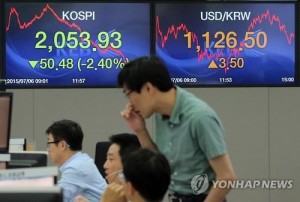- California Assembly OKs highest minimum wage in nation
- S. Korea unveils first graphic cigarette warnings
- US joins with South Korea, Japan in bid to deter North Korea
- LPGA golfer Chun In-gee finally back in action
- S. Korea won’t be top seed in final World Cup qualification round
- US men’s soccer misses 2nd straight Olympics
- US back on track in qualifying with 4-0 win over Guatemala
- High-intensity workout injuries spawn cottage industry
- CDC expands range of Zika mosquitoes into parts of Northeast
- Who knew? ‘The Walking Dead’ is helping families connect
S. Korea preparing contingency plan for Greece’s exit from eurozone

The benchmark Korea Composite Stock Price Index (KOSPI) posts its biggest daily fall in almost three years on July 6, 2015, amid lingering Grexit woes. (Yonhap)
SEOUL, July 6 (Yonhap) — South Korea is working on a contingency plan for Greece’s exit from the eurozone that could increase financial volatility, a ranking official said Monday, as Seoul stocks went into a tailspin on news of a Greek vote against bailout terms.
More than 60 percent of Greek voters rejected creditors’ demand for tough austerity measures in exchange for a bailout Sunday, triggering concerns over a “Grexit” from the eurozone and making investors jittery.
“We are working on a contingency plan as the likelihood of a Grexit has been bolstered, which would have a considerable impact on stock and foreign exchange markets,” said Choi Hee-nam, deputy minister of international affairs at the finance ministry.
Mounting concerns over a Grexit battered the South Korean stock market on Monday. The benchmark Korea Composite Stock Price Index (KOSPI) plunged 2.4 percent to 2,053.93, the biggest daily fall in almost three years.
The local foreign exchange market, however, ended relatively unscathed, with the Korean won closing at 1,126.5 won, down 3.5 won from the previous close.
Finance Minister Choi Kyung-hwan said the ministry is closely monitoring the situation as it can have a short-term impact on the local foreign exchange and financial market and vowed to “prepare to take measures, if necessary.”
Choi, however, added that the local stock market is seen to be in a relatively stable condition compared with other global markets.
Market experts said any impact from the Greek referendum would be short-lived and not be far-reaching compared with the past fiscal crisis in southern Europe.
In South Korea’s case, its limited exposure to Greece, together with its financial soundness, make it less vulnerable to the Greek crisis.
Local banks and non-bank institutions’ exposure to Greece stood at US$1.18 billion as of end-March, accounting for 1.3 percent of the country’s total overseas lending, according to the Financial Supervisory Service (FSS).
They said the South Korean stock market will be affected by the Grexit concerns in the short term, as the market has expected the situation and already reflected the issue on the price.
“The Grexit risk is a big drag on the South Korean financial market, but it isn’t expected to deal a harsh blow to the country,” said Kim Hyung-ryeol, a senior analyst at Kyobo Securities Co. “The market will experience short-term fluctuations but stop seeing the impact not long after.”
Investors will likely take a wait-and-see stance for a while, weighing what final decision will be made by Germany and France, the main creditors of Greece, said the experts.
The result of the referendum is widely expected not to have a direct impact on the local market, offset by other domestic factors, such as the central bank’s latest rate cut and an extra budget put forward by the government.
But going forward, South Korea is not insulated from the potential Grexit as European banks may pull their money out of South Korea amid continued chaos in Greece, government officials said.
The Bank of Korea (BOK) also held an emergency meeting Monday to discuss what impact the Greek vote will have on the local financial market.
“We are keeping close tabs on the possibility of increased volatility in the currency and bond markets,” a BOK official said. “Measures will be taken to stabilize the market should it become more volatile.”
FSS Gov. Zhin Woong-seob also said the financial regulator will continue to monitor the impact of the ongoing situation.
“What is important is whether a Grexit will be contained within the EU or whether its impact will spill over into other regions. Since South Korea is sensitive to external factors, we have to keep close tabs on the impact of announcements and market signals,” he said.















